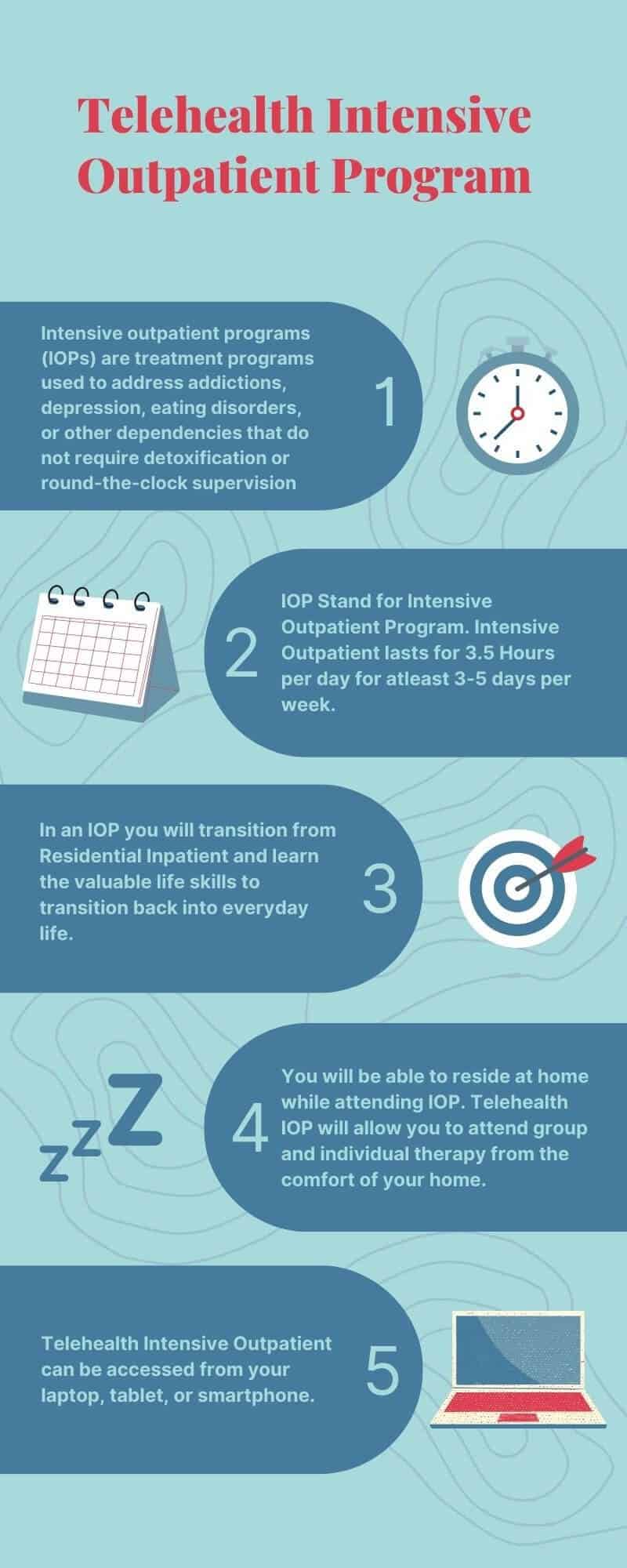The Advantages of Intensive Outpatient Program (IOP) for Long-Term Wellness.
The Advantages of Intensive Outpatient Program (IOP) for Long-Term Wellness.
Blog Article
Navigating the Intricacies of Twin Medical Diagnosis Therapy Within an Intensive Outpatient Program Establishing
In the world of psychological wellness and dependency therapy, the crossway of double medical diagnosis offers a nuanced difficulty that requires a thorough and customized technique. Within the boundaries of an Intensive Outpatient Program (IOP) setting, the intricacies of addressing co-occurring psychological wellness conditions and material make use of conditions need a delicate equilibrium of experience and resources to browse. The combination of evidence-based techniques, joint efforts amongst multidisciplinary teams, and an eager understanding of the unique needs of each person are vital elements in properly taking care of dual medical diagnosis within an IOP framework. By exploring the details of twin medical diagnosis treatment within this intensive outpatient context, a more clear path emerges in the direction of holistic and lasting recovery for those facing these linked difficulties.
Double Diagnosis Review

Understanding double diagnosis is necessary as it calls for a detailed and incorporated strategy to therapy. By acknowledging the interaction between substance use and psychological health, healthcare companies can tailor interventions to fulfill the one-of-a-kind needs of each person. This all natural approach not just addresses symptoms but likewise targets hidden aspects that add to the double medical diagnosis.
Furthermore, neglected twin medical diagnosis can result in a cycle of relapse and intensifying mental health signs and symptoms. By acknowledging the intricacy of dual diagnosis and giving specific care, medical care specialists can sustain individuals in achieving long-term healing and boosted mental wellness.
Tailored Therapy Plans
Recognizing the complex interaction in between compound use problems and psychological wellness problems, the growth of customized treatment plans is vital in addressing the intricacies of dual diagnosis in psychological health therapy. Tailored treatment plans are personalized techniques that consider the distinct requirements, challenges, and objectives of people dealing with dual diagnosis. These plans are made collaboratively by a multidisciplinary team of professionals, consisting of psychiatrists, psycho therapists, social workers, and dependency specialists, to guarantee comprehensive and incorporated care.
Tailored treatment plans usually include a combination of treatments, medications, and behavioral treatments that target both the material use problem and the mental health and wellness problem all at once. These plans may consist of cognitive-behavioral treatment, dialectical behavior modification, medication-assisted therapy, specific therapy, team therapy, and household therapy, to name a few evidence-based treatments. By customizing treatment methods to private situations, tailored strategies can address the origin creates of twin diagnosis, advertise long-term recuperation, and boost total quality of life for people dealing with co-occurring conditions.
Integrated Care Strategy
An integrated care method in twin diagnosis therapy integrates clinical, emotional, and social interventions to resolve the complicated needs of individuals with co-occurring material usage disorders and mental wellness problems. This strategy recognizes that dealing with one facet of a dual diagnosis without resolving the other can lead to ineffective results. By integrating clinical interventions such as medication administration for mental wellness conditions with emotional treatments like cognitive-behavioral therapy for material usage conditions, people obtain extensive treatment that targets all elements of their double diagnosis.
Moreover, the social aspect of incorporated treatment includes addressing ecological variables that may add to the growth or perpetuation of substance usage and mental health concerns. This can consist of family members dynamics, real estate instability, or absence of social support. By integrating social interventions like family members treatment, trade assistance, and neighborhood resources, the treatment ends up being much more all natural and customized to the individual's details needs. On the whole, an integrated treatment technique in dual medical diagnosis treatment within an extensive outpatient program setup intends to give extensive, effective, and personalized like individuals dealing with co-occurring problems.
Challenges in IOP Setting
In the context of twin diagnosis treatment within an extensive outpatient program, browsing the intricacies of co-occurring substance usage conditions and mental wellness problems presents substantial challenges. One of the key obstacles in the IOP setup is the sychronisation of treatment in between mental wellness specialists and material misuse experts to make certain an extensive therapy approach. This needs efficient communication, collaboration, and a deep understanding of how these conditions connect and affect each other.

In addition, resolving stigma and resistance to treatment within the IOP setting can impede progress. Some people might be hesitant to reveal their twin medical diagnosis or may really feel embarrassed, impeding their involvement in the healing process. Conquering these barriers necessitates a supportive and non-judgmental setting that cultivates trust fund and visibility.

Collaborative Expert Initiatives
Reliable twin medical diagnosis therapy in an extensive outpatient program necessitates seamless partnership amongst mental health and wellness experts and material misuse specialists to ensure an extensive and integrated approach to care. By functioning with each other, these specialists can produce read here personalized treatment plans that cater to the special demands of each person, thinking about both their psychological health and substance abuse challenges.
Collaborative efforts additionally reach normal interaction and information sharing amongst employee to make certain a natural treatment method. This may involve situation seminars, joint sessions with the individual, or shared paperwork to track progress and adjust treatment strategies as needed. In addition, partnership may include involving various other healthcare experts such as health care doctors or household therapists to provide alternative assistance to the client. Inevitably, an this article unified front of experts functioning together enhances the effectiveness of dual diagnosis therapy within an extensive outpatient program.
Verdict
To conclude, efficient double medical diagnosis therapy within an extensive outpatient program setting needs customized treatment strategies and an incorporated care approach. Challenges may develop in this setting, however collaborative initiatives among professionals can assist navigate these complexities. By attending to the unique needs of view website people with co-occurring psychological health and compound use disorders, IOP programs can provide comprehensive and holistic like sustain recuperation and overall wellness.
Report this page